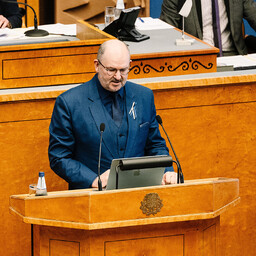Põhiseaduskomisjon otsustas
ühehäälselt, et ei toeta
kirikute ja koguduste seadus
e
muutmata kujul uuesti vastuvõtmist
. Komisjoni esimees Ando Kiviberg ütles, et parlamendil tuleb teha seadusesse vajalikud muudatused. Need muudatused peavad arvestama presidendi seisukohti ja viima seaduse põhiseadusega kooskõlla. Nii saab vältida, et
usuorganisatsioone kasutatakse ära
vaenu või vägivalla õhutamiseks
.
Põhiseaduskomisjon otsustas
Tõlge fraasile: Põhiseaduskomisjon otsustas
EN
The Constitutional Committee decided
kirikute ja koguduste seadus
Tõlge fraasile: kirikute ja koguduste seadus
EN
Churches and Congregations Act
muutmata kujul uuesti vastuvõtmist
Tõlge fraasile: muutmata kujul uuesti vastuvõtmist
EN
re-adoption without changes
usuorganisatsioone kasutatakse ära
Tõlge fraasile: usuorganisatsioone kasutatakse ära
EN
religious organizations are misused
vaenu või vägivalla õhutamiseks
Tõlge fraasile: vaenu või vägivalla õhutamiseks
EN
to incite hatred or violence
Riigikogu võttis
kirikute ja koguduste seadus
e muutmise seaduse vastu 9. aprillil. President jättis seaduse 24. aprillil välja kuulutamata. Ta leidis, et seadusega loodav usuvabaduse ja ühinemisvabaduse piirang ei ole proportsionaalne. President soovitas seadust uuesti arutada ja viia see põhiseadusega kooskõlla.
kirikute ja koguduste seadus
Tõlge fraasile: kirikute ja koguduste seadus
EN
Churches and Congregations Act
Riigikogu täiskogu
s arutatakse seadust uuesti pärast seda, kui õiguskomisjon on võtnud selle kohta seisukoha. Täiskogus esinevad põhiseaduskomisjoni ja õiguskomisjoni esindajad. Iga saadik võib neile esitada ühe küsimuse. Seejärel algavad läbirääkimised, kus saavad rääkida riigikogu liikmed ja komisjonide esindajad. Pärast läbirääkimisi hääletatakse seaduse muutmata kujul uuesti vastuvõtmise üle.
Riigikogu täiskogu
Tõlge fraasile: Riigikogu täiskogu
EN
the plenary session of the Riigikogu
Kui riigikogu ei võta seadust muutmata kujul uuesti vastu, määratakse seadusele
muudatusettepanekute esitamise tähtaeg
. Seaduse edasine menetlemine jätkub üldises korras.
muudatusettepanekute esitamise tähtaeg
Tõlge fraasile: muudatusettepanekute esitamise tähtaeg
EN
deadline for submitting amendment proposals
Seadusega soovitakse tagada, et Eestis tegutsevaid usuorganisatsioone ei saaks ära kasutada
vaenu või vägivalla õhutamiseks
. Eesti toetab usuvabadust, kuid riik peab arvestama ka väljakutsetega, mis ohustavad
riigi julgeolekut ja ühiskonna turvalisust
.
vaenu või vägivalla õhutamiseks
Tõlge fraasile: vaenu või vägivalla õhutamiseks
EN
to incite hatred or violence
riigi julgeolekut ja ühiskonna turvalisust
Tõlge fraasile: riigi julgeolekut ja ühiskonna turvalisust
EN
national security and public safety
Seaduse kohaselt ei tohi Eestis tegutsev kirik, kogudus või klooster olla seotud välisriigis asuva mõjuka isiku või ühendusega, kui see ohustab Eesti riigi julgeolekut. Selline oht võib tekkida, kui
välisriigis asuv vaimulik keskus
toetab sõjalist agressiooni või terrori.
välisriigis asuv vaimulik keskus
Tõlge fraasile: välisriigis asuv vaimulik keskus
EN
spiritual center located abroad
Seadus täpsustab ka, kes saab Eestis vaimulikuna teenida või kuuluda usulise ühenduse juhatusse. Vaimulik või juhatuse liige ei saa olla inimene, kes ei tohi Eestis elada või viibida. Lisaks luuakse võimalus
lahkuda kirikust
, kui selle tegevus või põhikiri ei vasta nõuetele. Selleks peab kogudus või klooster vastu võtma uue põhikirja.
lahkuda kirikust
Tõlge fraasile: lahkuda kirikust
EN
leave the church
The Constitutional Committee unanimously decided not to support the re-adoption of the Churches and Congregations Act in its unchanged form. Committee Chairman Ando Kiviberg said that Parliament must make the necessary amendments to the law. These amendments must take into account the President's positions and bring the law into conformity with the Constitution. This will prevent religious organizations from being exploited to incite hatred or violence.
The Riigikogu adopted the Act Amending the Churches and Congregations Act on April 9. The President did not proclaim the law on April 24. He found that the restriction on freedom of religion and freedom of association created by the law is not proportionate. The President recommended reconsidering the law and bringing it into conformity with the Constitution.
The Riigikogu plenary session will discuss the law again after the Legal Affairs Committee has taken a position on it. Representatives of the Constitutional Committee and the Legal Affairs Committee will speak at the plenary session. Each MP may ask them one question. Then negotiations will begin, where members of the Riigikogu and committee representatives can speak. After the negotiations, a vote will be held on the re-adoption of the law in its unchanged form.
If the Riigikogu does not re-adopt the law in its unchanged form, a deadline for submitting amendments to the law will be set. Further processing of the law will continue in the usual manner.
The law aims to ensure that religious organizations operating in Estonia cannot be exploited to incite hatred or violence. Estonia supports freedom of religion, but the state must also consider challenges that threaten national security and public safety.
According to the law, a church, congregation, or monastery operating in Estonia must not be associated with an influential person or organization in a foreign country if it threatens the national security of Estonia. Such a threat may arise if a religious center located abroad supports military aggression or terrorism.
The law also specifies who can serve as a clergyman in Estonia or be a member of the board of a religious association. A clergyman or board member cannot be a person who is not allowed to live or stay in Estonia. In addition, the possibility of leaving a church is created if its activities or statutes do not meet the requirements. To do this, the congregation or monastery must adopt a new statute.

